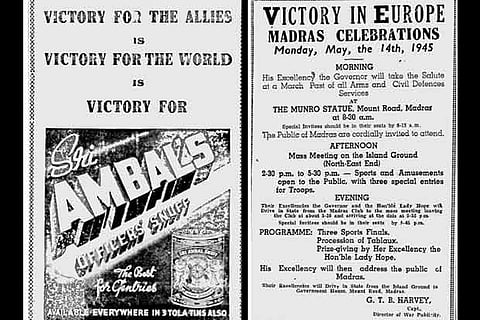

Chennai
The Second World War was a global conflict lasting over six years from 1939. It directly involved more than 100 million people from over 30 countries but a vast majority of the world nations were part of the conflict with the line between civilian and military personnel blurred.
Madras escaped much of the war bombings, except a lone incident. The British Raj, as part of the Allied Nations, had sent over two and a half million Indian soldiers to fight under the British command against the Axis powers - many of them were from Madras presidency. Though it was infrequently and sparsely attacked, Madras was a part of the World War 2.
People were aware of the trend in the conflict. With the allied forces encircling Hitler’s Berlin, it was only a matter of time everyone knew before the war ended in Europe. After a few false starts, the real surrender was reported in the radios. After listening to the news in the community radio sets, British soldiers were dancing on the streets of Madras. The citizens too celebrated.
Madras was one city that had endured the war with much trial and tribulations. It had been bombed only once with not much damage but had spent sleepless nights for years together. Blackouts and air raid patrol drills caused a fearful population to evacuate. Many soldiers from the Madras presidency returned home to their families. Many like Major Kumaramangalam who later headed the Indian army were released from German prisoner war camps and were treated to a high tea in Buckingham Palace by the king-emperor. The V Day (also called VE day to signify victory in Europe) was celebrated much before the actual end of the war. The Japanese who had constantly threatened Madras after the fall of Singapore had not surrendered yet. The corporation schools distributed chocolates. The Central Station was tastefully decorated and floodlighting was done in the night whereas the Egmore Station had a military parade.
Almost all the churches in Madras had their bells tolling continuously. Thanksgiving services to commemorate the victory of the allies in Europe were held at St George’s Cathedral and was attended by Governor Hope and his wife. The Hindu establishments didn’t lag behind. Kapaleeshwarar Temple served free food to the poor. There were recitations of thevarams (holy Tamil songs), archanas and abhisekams to the idols.
In the Theosophical Society (TS), Arundale, the president, hoisted the allied country flags and theosophical flag alongside. That was with a sense of relief as most of TS had been commandeered by the RAF. Now, they could look forward to its return. In his speech, Arundale severely criticised the one VIP who refused to celebrate the V Day, George Bernard Shaw. Catching onto the mood of the city, newspaper advertisements from snuff powder to savings certificates reflected the news of the day. The parades were the official response of the government to the victory. The victory parade was scheduled for an hour from 8.30 on May 14 at the foot of Munro statue. Judges and prominent citizens of the city sat at the base of the statue.
The parade had the royal navy in front, followed by more than a dozen services. Women belonging to the royal navy, St. Johns, Red Cross and Auxiliary corps participated in great numbers. Some divisions were mounted on horses too. The musical band, loud and boisterous, was in the last of the procession. The band struck, ‘God Save The King’ and the Madras guards furnished the guard of honour. Sir Arthur Hope, surrounded by children and officers, took the salute and they were photographed profusely. Tens of thousands lined on both sides of the Gymkhana and excesses moved into Gymkhana Club and Island Grounds.
A record of the mood of those times was preserved for posterity by novelist-poet Kothamangalam Subbu. Describing the strenuous conditions under which they left the motherland and fought in the foreign soil, he welcomed them back in a poem. It was a couple of pages long in Ananda Vikadan.
A meeting of the City Council held in Ripon Building congratulated the allied powers on their brilliant victory and expressed the hope that the British government would grant independence to India as promised on an earlier date.
— The writer is a historian and an author
Visit news.dtnext.in to explore our interactive epaper!
Download the DT Next app for more exciting features!
Click here for iOS
Click here for Android